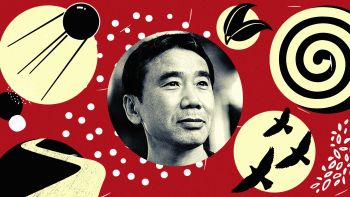Aimless in Morisaki bookshop

My introduction to the Bangla translation of Japanese books happened during my visit to Baatighar Chittagong. It was there that I encountered the Bangla translations of works by one of my favourite Japanese writers, Haruki Murakami, back in 2021. Then last year, I found myself enchanted with the promise of Morisaki Boighorer Dinguli (Abosar Prokashona, 2023); the allure of the black edition of the book boasting ebony pages and stunning artwork had me yearning for the book months before its scheduled release.
One thing that I noticed when I opened the book first was the dedication. Salman Haque, the translator, dedicates it to the second hand bookshops in our very own Nilkhet. To me, it felt like a beautiful rhyme between the work of Satoshi Yagisawa about second hand books and the second hand books heaven we have here. Reading this slice-of-life narrative in my native language brought about a distinct charm—it felt like a journey into the familiar; the book effortlessly traverses boundaries of countries, traditions, and languages, creating a universal connection. The traits of the characters and the journey they go through feel very personal and familiar, even though the context and the setting are much different than that of our country.
While at first sight it might seem like the whole book revolves around one Morisaki Bookshop, an entire street that is filled with second-hand and pre-loved books stores, cafes, lush greens, and people who have a genuine appreciation for books fill up the pages of the story. The book is divided between two chapters and each could be a book in their own right.
The first chapter of the story focuses on the life of Takako at a time when her life is turned upside down upon learning that her boyfriend is soon to get married to someone else. Takako, not being able to stand working in the same place as her ex, leaves her job and decides to spend a few months at her uncle Satoru's second-hand bookshop in Jimbocho, Tokyo. She is initially resistant to the idea of residing in the Morisaki Bookshop but gradually embraces the enchantment of this space. For someone in love with the world of books and literature, the backdrop of this story filled me with whimsy. When Takako first went into her room filled with piles of books, a profound yearning to trade places with her washed over me.
As the narrative unfolds, we delve into the backstories of various characters, including glimpses into Satoru's youth—a time marked by the uncertainty and aimlessness that often accompanies early life. As a bilingual reader, I often tend to compartmentalise complex emotions in a foreign language to create a sense of distance. However, reading about these anxieties in my native tongue made them more palpable, more real.
In many ways, the second chapter rhymes with the first. While we are still experiencing the book from the point of view of Takako, she is not the main focus anymore. The emphasis is now on the relationship of Saturu and his wife Momoko. While in the first it was Satoru helping Takako turn a new leaf, in this one the roles are reversed—Takako helps Satoru reconnect with his wife. We learn more about how Satoru and Mokomo met in Paris, how their love began, and what led to their separation and eventual rekindling.
The simplicity of Satoshi Yagisawa's writing is very appealing to me. Showing the quirks of the characters was a very effective way to flesh them out, adding depth to the narrative. One such quirk is how Mokomo expresses her affection by pinching the cheeks of her loved ones. At one point of the story we see that Takako is opposed to it but by the end, she not only expects to be pinched but anticipates it with eagerness. This simple act becomes a powerful symbol, subtly conveying the shift in attitudes and the deepening bond between these characters.
In the end, the plot of the book is short and rather simple but it reveals so much about the human struggle of these universal anxieties. The setting and the environment does a lot of heavy lifting, elevating the book. For me, the allure of Japanese literature, especially in the slice-of-life genre, lies in its effortless prose. It is so matter-of-fact, offering a glimpse into the lives of its characters. Salman Haque masterfully captures the same feeling in this native translation as well. The world of Morisaki bookshop feels lived in, as if the characters have lived in it for years and will continue to live through long after the story is over.
I want to leave the readers with a few lines by Yagisawa (translated to English by Eric Ozawa): "The Morisaki Bookshop stands alone at the corner of a street crowded with used bookstores. It's tiny and old and really nothing much to look at. There aren't many customers. But there are people who love this store. And as long as they're devoted to it, then that's enough."
Nafis Anwar is trying his best to come up with a witty author bio.

 For all latest news, follow The Daily Star's Google News channel.
For all latest news, follow The Daily Star's Google News channel. 








Comments